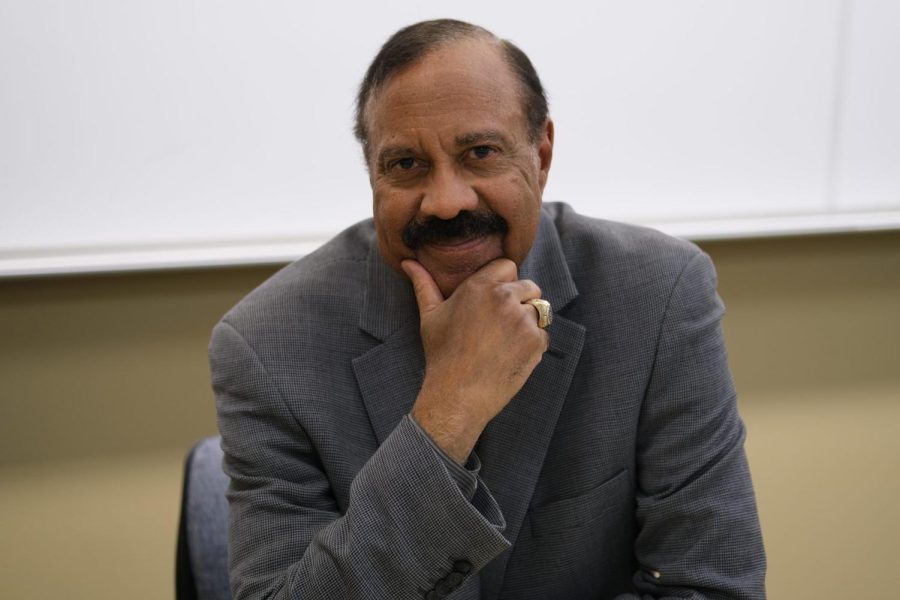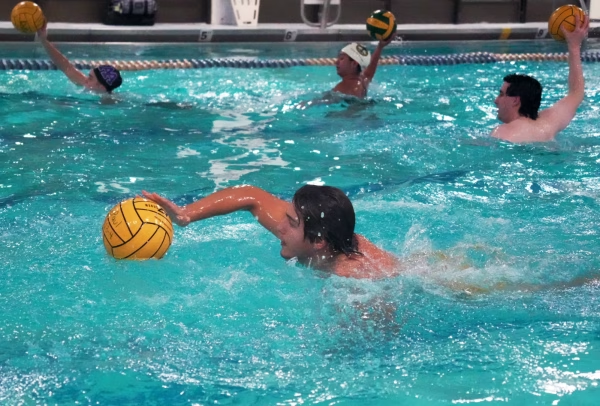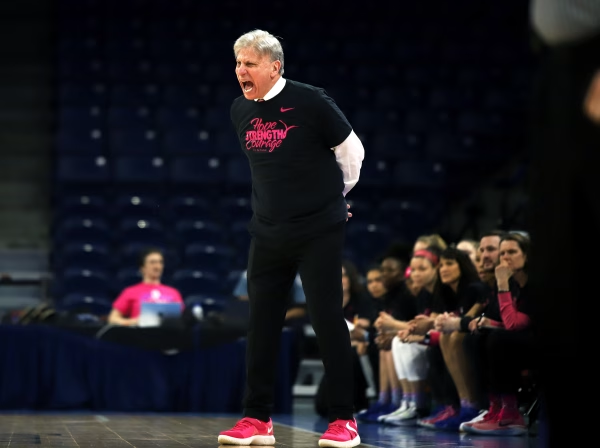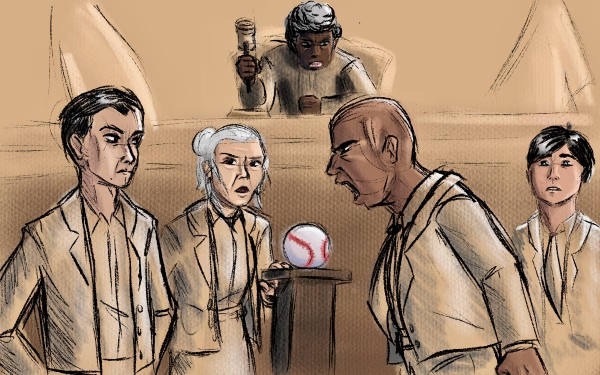Behind the Chicago sports legend: Professor in College of Communication shares journey
Professor Mitchell worked at the Chicago Tribune from 1974-2015. He began teaching at DePaul in 2017, and started as the executive producer at Jordan & Jordan Communications in 2019.
When it comes to sports, Frederick Mitchell has left no stone unturned.
From setting NCAA records authoring books with the likes of Gale Sayers and Billy Williams, the trailblazing journalist has seen and done it all.
Mitchell began demonstrating his journalistic prowess at just 7 years old when he interrogated NFL legend Ollie Matson in his friend’s living room.
“My friend Paige Smith would always brag and say he was related to Ollie Matson, and one Saturday morning, he called me up and told me Ollie was sitting in his living room,” Mitchell recalled with a smile. “The first thing I did was grab my Ollie Matson football card and run over there. On the back of the cards they had all of his facts: height, weight and what college he went to. So I started quizzing him to make sure it was really him.”
Born in Cincinnati, Mitchell attended Wittenberg University in Springfield, Ohio, from 1965 to 1968 and played football. There, he set the NCAA record for most career points scored by kicking.
When recalling his youth, Mitchell points out the significance of his father’s influence.
“He was a voracious reader and a great sports fan who read the newspapers all the time, so naturally I followed suit and would read all the time,” Mitchell said. “I don’t know whether it’s just a natural curiosity but I always followed all the sports minutiae, collecting baseball cards and cutting out magazine articles like I was putting together a book. It was just fascinating to me to chronicle what was going on.”
After graduating, Mitchell played semi-pro football for the Columbus Bucks and the Chicago Heights Broncos, all while teaching English and coaching football and track at Grove City High School in Ohio.
“I always tell people that if there was enough time in the day, I would do all of those things,” Mitchell said. “Be a football coach, a track coach, a high school English teacher and a sports writer. There’s just not enough time in the day.”
After five years of teaching at Grove City, Mitchell realized he wanted to do something different. He just wasn’t sure what.
Enter the Chicago Tribune in 1974, where Frederick Mitchell became the newspaper’s first ever African American sports writer.
“I told my friend Bill Lowry, ‘I’d really like to be a sportswriter, but I don’t think that’s possible,’” Mitchell said. “But the only reason I was saying that was because I didn’t see any African Americans ahead of me who had done that.”
Mitchell was the beat writer for the Chicago Bulls during part of the Michael Jordan era, an experience that he isn’t likely to forget anytime soon.
“They were treated like rockstars,” Mitchell said about the late 90s Bulls. “If you went to cover them on a road game, you would expect throngs of fans in hotel lobbies and mobs when they stepped off the bus. You knew you were a part of a special sports history at that time.”
Mitchell spent 41 years at the Tribune, garnering much admiration from readers and colleagues alike during his tenure.
“Fred is the kind of guy who sources just really genuinely like and trust,” said Melissa Isaacson, a former Tribune coworker of Mitchell’s. “That’s not an easy thing to obtain, and it takes time and patience to develop relationships. His lowkey manner attracted both management and athletes because he was just genuinely nice and people really respected him.”
Mitchell remains the only writer in the history of the Tribune to cover the Chicago Bulls, Cubs and Bears as a main beat assignment. His legendary career won him the Chicago Union League Club’s Ring Lardner Award for outstanding sports journalism in 2015.
But what stands out most to those who know Fred Mitchell is his character and kind heart.
“Watching him from afar taught me that if you were just a good person and a good, honest reporter that eventually your sources would get to know that about you and begin to trust you,” Isaacson said. “Watching how he sustained respectability and decency over the long haul was very instructional for me.”
Now, Mitchell spends his weeknights standing behind a podium in DePaul’s Maggie Daley Building, sharing his decades of journalistic skill and sports knowledge with students and making an impact on a professional and personal level.
“Although he’s had so much success in the Chicago sports world, he always takes an interest in every student and wants to be a resource to all,” said recent DePaul graduate Ashley Gimbel. “When I got hired at my first full-time job post graduation, he was one of the first people to send me a note and congratulate me.”
Any professional in the College of Communication will likely tell you that Professor Mitchell is a valuable asset to the university.
“Fred has institutional knowledge of journalism and the sports industry in Chicago that’s hard to match,” said College of Communication journalism chair Jason Martin. “He brings his own perspective as a pioneer in sports journalism to class in a way that resonates with students from all backgrounds and inspires them. He’s such an outstanding instructor and one of the most respected journalists in the history of the city.”
Mitchell has recently expanded his role in the College of Communication, becoming a representative on the Adjunct Faculty Advisory Board.
“Fred is very generous with his time, often volunteering as a guest speaker in other classes or on panels devoted to the challenges and opportunities facing journalism today,” said Lexa Murphy, Dean of the College of Communication. “He has a proven dedication and passion for students, and I have no doubt that, in his new role, he will work equally hard to make sure other adjunct faculty feel well-supported and inspired in teaching their students.”
But Professor Mitchell isn’t just a teacher. He’s also a storyteller.
“The way he just seamlessly makes his stories and experiences translate to good teaching is incredible,” Isaacson said. “Having a lot of experience does not make you a good teacher. He has a million stories, a vivid memory and really great journalism skills. So it wasn’t hard for him to turn that into being a really good teacher.”
Mitchell is the namesake for one of the most prestigious National Football Foundation awards. The annual Fred Mitchell Award, established in 2009, goes to the top placekicker among 750 non-FBS colleges in America and is awarded based on kicking performance and community service.
“It means an awful lot to have my name associated with the award,” Mitchell said. “We created it to recognize non-FBS college kickers because they deserve recognition too. I remember asking my colleague Chris Karney, ‘There’s no award for these guys?’ And he said, ‘No, but we should make one and name it after you.’”
At the end of the day, Mitchell wants his students to benefit from the many lessons he has learned from his decades spent in the industry.
“I know that there will always be a need for responsible journalism: well researched, factual accounts,” Mitchell said. ‘This is what I try to train my students with today. Have integrity, be responsible, stress the importance of relationships and people skills and always feel that you can improve and become the best version of yourself. In the many years and decades that I’ve been involved in writing, I’ve never gotten to the point where I can say I’ve finally perfected it.”
But, those who know him best can say he’s come pretty darn close.







